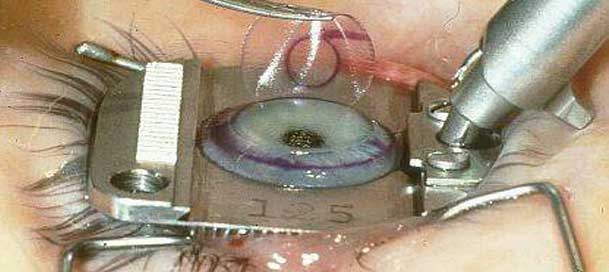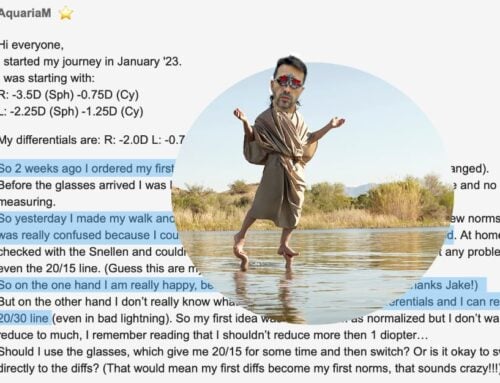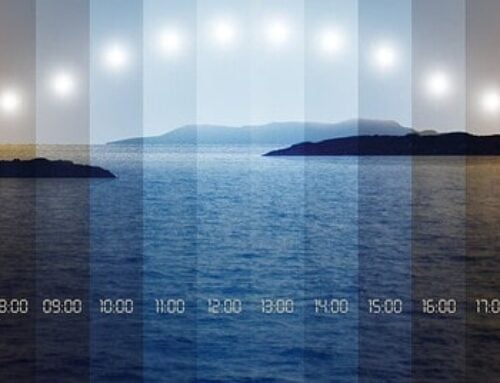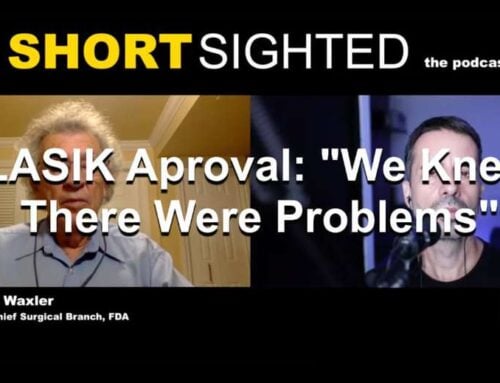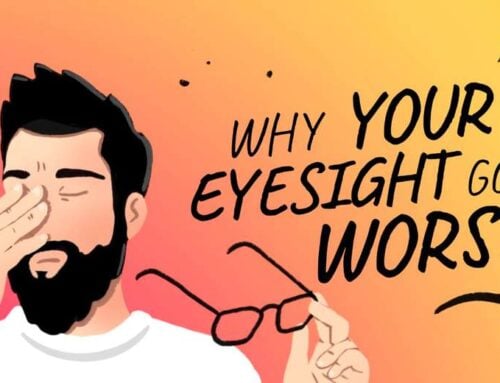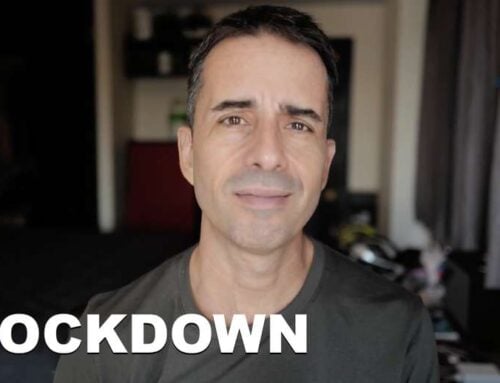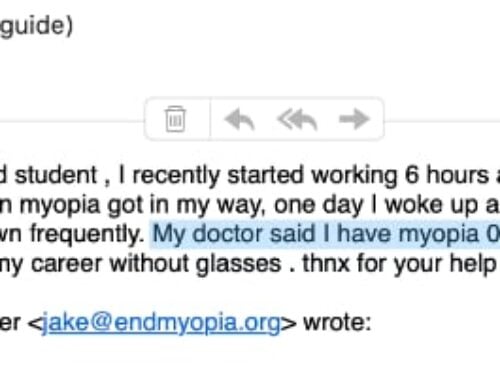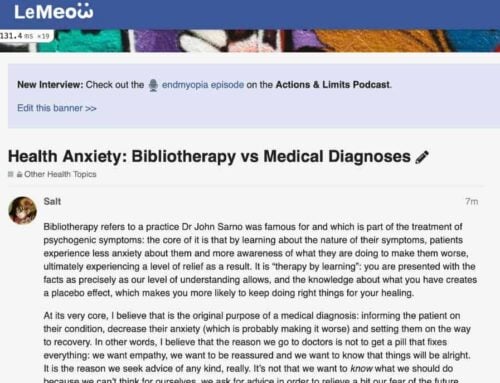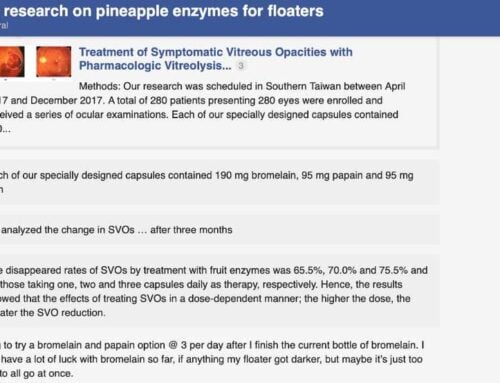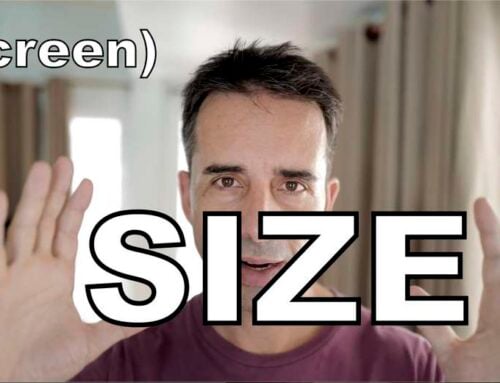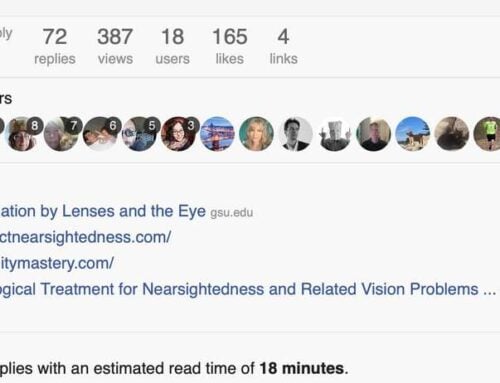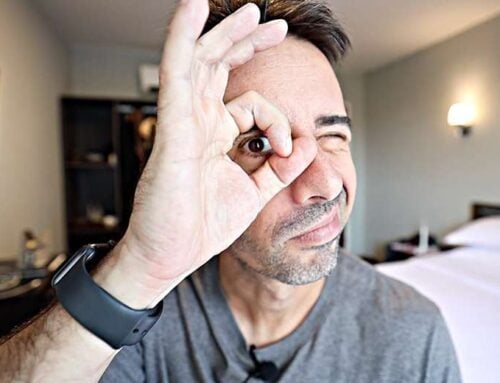Let’s touch on lasik surgery as a high myopia solution (to reduce retinal detachment), just briefly.
This e-mail came across my desk the other day:
![]() I happened to stumble across your page as a desperate attempt to see whether my vision can be improved at all. I am VERY myopic, wearing contact lens at -10.50 and having glasses at -12. 2 days ago, I went to get an eye exam and the optometrist gave me a new glasses prescription of -12.25 (with minor astigmatism). And as you know, with a prescription that high, I wouldn’t be able to see anything unless I end up smelling it, about 2 inches away from my eye. The optometrist advised me that due to my myopia, my best bet would be to get surgery as I have increased risk for retina detachment and I also have an appointment to get dilation done in February.
I happened to stumble across your page as a desperate attempt to see whether my vision can be improved at all. I am VERY myopic, wearing contact lens at -10.50 and having glasses at -12. 2 days ago, I went to get an eye exam and the optometrist gave me a new glasses prescription of -12.25 (with minor astigmatism). And as you know, with a prescription that high, I wouldn’t be able to see anything unless I end up smelling it, about 2 inches away from my eye. The optometrist advised me that due to my myopia, my best bet would be to get surgery as I have increased risk for retina detachment and I also have an appointment to get dilation done in February.
If you are familiar with this site, you know what I am going to say.
Bad, bad, dangerous, illogical, head shakingly ill conceived, exceedingly common recommendation, that I hear on a (frighteningly) weekly basis.
Lasik surgery is being offered as something approaching cosmetic surgery, in terms of a solution.
Convenience, not needing glasses, a tiny little bit of laser and before you know it, you have 20/20 eyesight. All sins pardoned, go forth my child, and see perfectly. What caused the myopia? Well … never mind that. Would you like to hear about our great financing plans for the procedure? How about a brochure?
If someone who is being entrusted with your eyesight health even takes a moment to think about that logic, they couldn’t possibly make this recommendation. And even you, with two simple questions, can bring that whole recommendation into the right light:
1. What Causes Retinal Detachment?
2. How Does Lasik Surgery Reduce This Retinal Detachment Risk?
Of course in reality I don’t recommend asking these questions.
I do recommend leaving the shop, maybe avoiding turning your back towards any of the staff as you exit the building. Maintain a friendly smile, don’t show teeth, no sudden movements, and don’t make direct eye contact.
Here is my response that that part of the e-mail question:
![]() The retinal detachment risk is increased due to your eyeball elongating (which happens due to the continued strain on your focusing muscle, which is caused, ironically, by the high and increasing prescriptions). The retina, attached to the back of the eyeball becomes increasingly deformed with this elongation (since the eye goes from a round ball shape, to something of an egg shape). Eventually the detachment rips – in high myopia cases, especially at an older age, this is a fairly notable risk (there was this story, by a client back in August).
The retinal detachment risk is increased due to your eyeball elongating (which happens due to the continued strain on your focusing muscle, which is caused, ironically, by the high and increasing prescriptions). The retina, attached to the back of the eyeball becomes increasingly deformed with this elongation (since the eye goes from a round ball shape, to something of an egg shape). Eventually the detachment rips – in high myopia cases, especially at an older age, this is a fairly notable risk (there was this story, by a client back in August).
Laser surgery changes nothing about the eyeball shape.
Instead, laser surgery just creates a permanent focal plane correction (like cutting a lens into the front of your eye), making it almost impossible to then actually reverse the elongation with rehabilitation – and so you end up permanently stuck with a high risk for retinal detachment.
A rehabilitative approach would be worth exploring as better alternative, for the long term.
So obviously, lasik surgery does nothing to reduce retinal detachment risk.
All it does, is hide the symptom, temporarily improve your vision, put referral money in the optician’s pocket, and pay the lasik surgery shop’s bills. Back in the practice days, we had a specific protocol for post lasik clients who would come due to retinal detachment risk. And you don’t really want the details – the short, least traumatizing version, is that it’s far less than convenient, or encouraging.
And of course, there are lots of other noteworthy risks with lasik surgery, such as discussed here.
Studies on the subject of lasik surgery and retinal detachment have to be regarded with some concern for bias (more than a few are funded by interest groups profiting from this procedure). Also keep in mind, that actual retinal detachment is a very low percentage occurrence in the general population, even in the high risk, high myopia group. So the chances are that your won’t suffer retinal detachment regardless, and studies suggesting that the rate of incidence is not higher after lasik surgery in actuality does nothing to substantiate the benefits of the procedure. What we would want to see is that lasik surgery actually lowered the incidence of retinal detachment.
And to my knowledge, not a single (meaningful) study exists, showing a lowered retinal detachment percentage.
Feel free to use the blog search function to take a look at some of the other articles on the subject of retinal detachment. It’s an entirely avoidable condition (for most people), especially if you don’t get a large, permanent focal plane correction via lasik surgery.
Of course all that said, there are plenty of good reasons to get lasik surgery. I am not advocating a black & white stance on the subject.
Some high myopes can very much benefit from the procedure. Done after some rehab, in moderation, in a case where we have a low likelihood of problems with tear fluid, night vision problems, or any of the other potential issues, the procedure can be very beneficial.
Let’s just alway start out with looking at the cause of the symptom, before we pull out the sharks with laser beams (or cutting into our eyes with lasers).
Enjoy some healthy eyesight!

